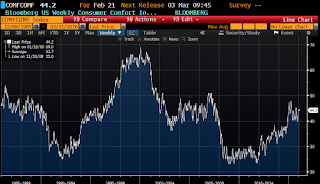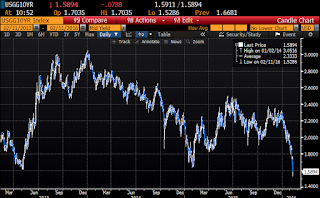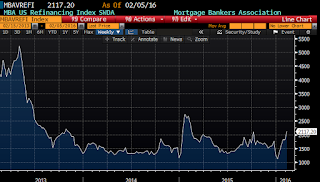| Last | Change | Percent | |
| S&P Futures | 1941.7 | -1.0 | -0.05% |
| Eurostoxx Index | 2920.2 | -8.9 | -0.30% |
| Oil (WTI) | 32.89 | 0.1 | 0.34% |
| LIBOR | 0.635 | -0.001 | -0.08% |
| US Dollar Index (DXY) | 98.3 | 0.153 | 0.16% |
| 10 Year Govt Bond Yield | 1.75% | -0.01% | |
| Current Coupon Ginnie Mae TBA | 105.3 | ||
| Current Coupon Fannie Mae TBA | 104.7 | ||
| BankRate 30 Year Fixed Rate Mortgage | 3.69 |
Markets are higher this morning after the Chinese cut reserve requirements in an effort to stimulate their economy. Bonds and MBS are flattish.
The ISM Milwaukee Index improved to 55.2 from 50.4, while the Chicago Purchasing Manager index fell to 47.6 from 55.6.
Pending Home Sales fell 2.5% in January, according to NAR. A dearth of inventory continues to weigh on the market.
The corporate bond market is having difficulty digesting new issuance. Over the past 12 months, there have been 75 "no go" days, where the primary market was essentially shut. This is higher than the bad old days of 2008-2009. High Yield is even worse, with issuance down 75% year-over-year.
When the stock and bond markets disagree, go with what bonds day. Unsurprisingly, asset managers continue to rotate out of stocks and into bonds.
Warren says don't worry, be happy. Also the annotated version of the annual letter.
What are the characteristics of houses that sell quickly? Spanish architecture and 1,500-2,000 square feet.
Originator and servicer Walter Investment reported lower than expected earnings this morning and the stock is down about 10%. for 2015, originations were up 36% and the servicing portfolio increased by 4%. In the fourth quarter, origination volume was up 8% YOY.
Walter wasn't the only company to miss this morning: Ocwen also is down about 11% after missing its quarter. Delinquencies rose to 13.7% from 13.1%.








